AMC
Ylipäällikkö
Turkki lähtenyt hämmentämään Irakin puolelle.
Follow along with the video below to see how to install our site as a web app on your home screen.
Note: This feature may not be available in some browsers.
Myös Kreikan suunnalta kuulunut ilmoituksia ilmatilan loukkauksista.Turkki lähtenyt hämmentämään Irakin puolelle.
Turkish President Recep Tayyip Erdogan on Wednesday said the central government in Baghdad supported Turkey's latest offensive against outlawed Kurdish militants in northern Iraq.
The Turkish leader's comments came a day after Iraq summoned Turkey's ambassador to Baghdad to lodge a formal protest against Erdogan's latest military campaign.
Turkey's armed forces have reported the death of two soldiers and dozens of Kurdish militants since the launch Sunday of their third offensive in northern Iraq since 2020.
Erdogan told a parliamentary meeting of his ruling party that both Baghdad and the leaders of the autonomous Kurdish region based in Arbil supported Turkey's ground and air assault.
"I thank the central government in Iraq and the regional administration for their support to our fight against terror," Erdogan said.
"I wish success for our heroic soldiers involved in this operation, which we are carrying out in close cooperation with the central Iraqi government and the regional administration in northern Iraq."
Officials in Baghdad are publicly voicing displeasure over the Turkish military push into the mountains of northern Iraq, and later on Wednesday the government dismissed Erdogan's claims.
"We promise that everything the Turkish side keeps saying regarding any coordination or agreement with the Iraqi government is not true," foreign ministry spokesman Ahmed Al-Sahhaf said, quoted by state news agency INA.
The ministry for Iraqi Kurdistan's peshmerga fighters on Wednesday also denied any cooperation or participation by Arbil in the Turkish military operation.
"We deny all the accusations and declare that the peshmerga forces did not take part in these operations," it said in a statement, lashing out at "irresponsible media".
The foreign ministry on Tuesday said Iraq handed the Turkish ambassador a "firmly-worded note of protest" urging its northern neighbour to "put an end to acts of provocation and unacceptable violations".
Some analysts believe that Iraqi leaders -- while lodging formal protests -- are privately happy that Turkey is trying to punish fighters from the Kurdistan Workers' Party (PKK).
The group is classified as a terrorist organisation by both Ankara and its Western allies.
The PKK has been waging an insurgency against the Turkish state since 1984 that has claimed tens of thousands of lives.
PKK mainitaan kuten tavallista mutta tuo saattaa kohdistua Suomenkin avustamia peshmergoja vastaan, jotka käsittääkseni ovat eri kuppikuntaa kurdien kesken. Nehän esimerkiksi Mosulin valtasi ja muutenkin teki valtaosan sotatyöstä isiksien hirmuvallan ajamiseksi pois Irakista. Ei käy kateeksi kurdikansaa kun kurmootusta on tullut sekä Saddamin toimesta etelästä että nyttemmin pohjoisesta, eikä loppua sille näy. Sitkeitä sissejä.
Jätä sulttaani ne kurdit rauhaan!
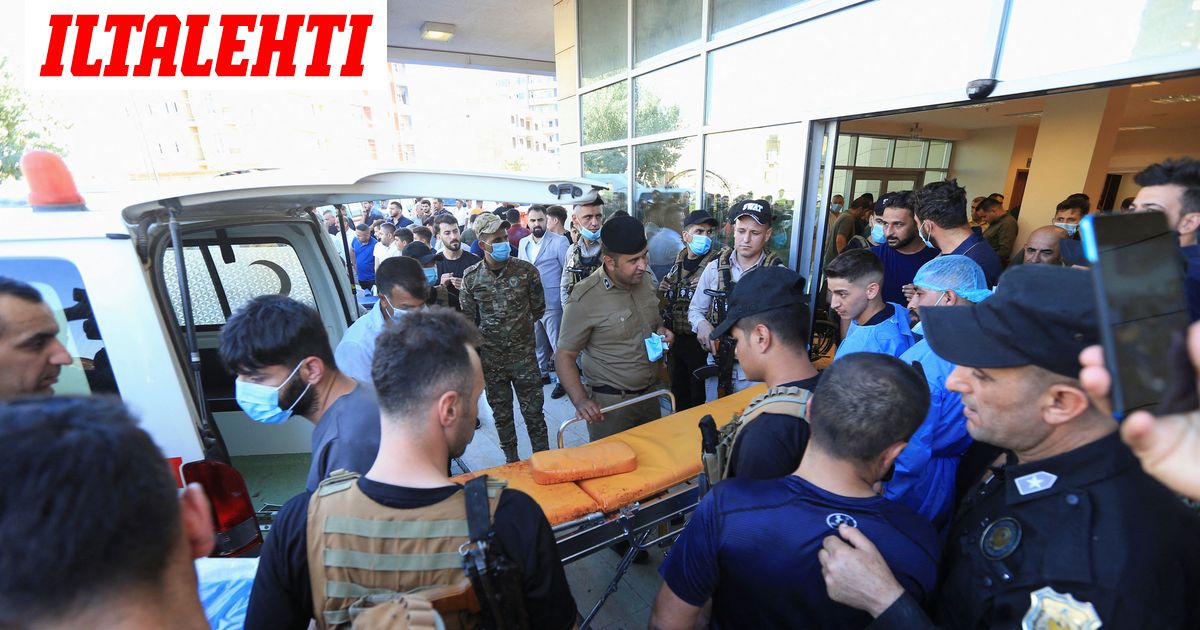

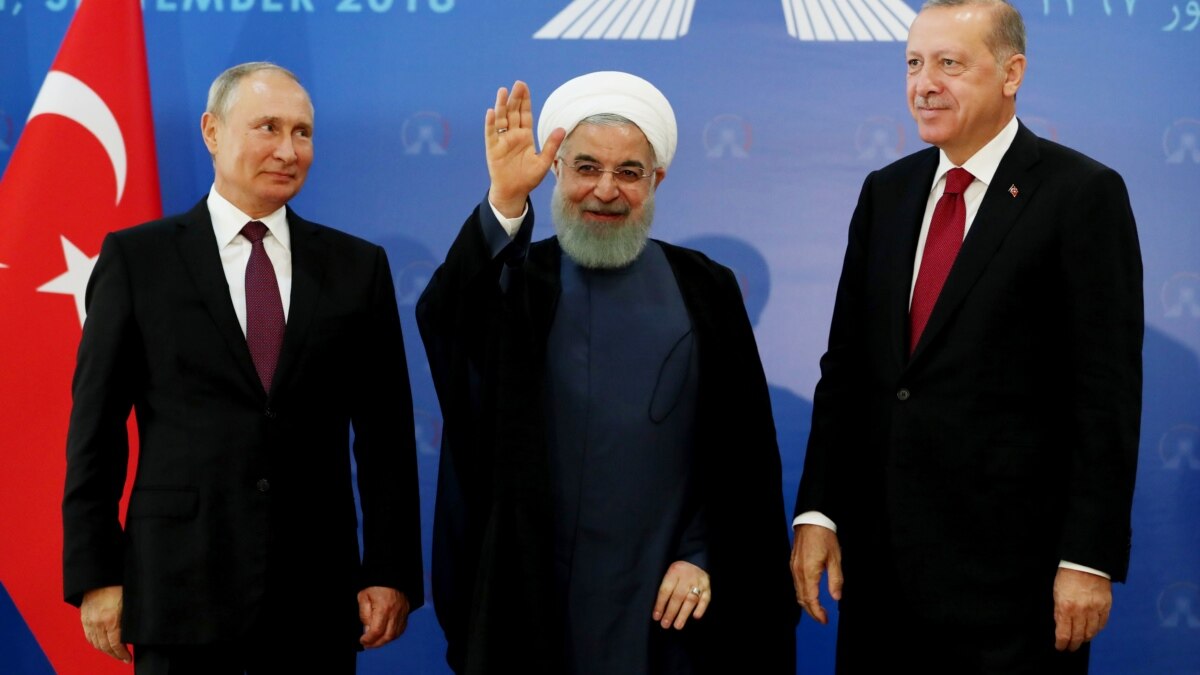
Iraqi Prime Minister Mustafa al-Kadhemi declared a day of national mourning Thursday after nine holidaymakers were killed in the bombardment of a Kurdish hill village he blamed on neighbouring Turkey.
The bodies were to be flown to Baghdad from the Kurdish regional capital Arbil to be handed over to the families for burial in their hometowns in southern and central Iraq, a Kurdish official said.
Thursday's shelling in the Zakho district village of Parakh also wounded 23 people, the majority of them domestic tourists seeking respite from the heat of the plains in the mountains of the Kurdish north.
The deaths in a village pleasure garden prompted several dozen angry demonstrators to protest outside the Turkish visa office in Baghdad early Thursday, despite a heavy police presence.
Loudspeakers blared out patriotic songs as protesters chanted slogans demanding the expulsion of the Turkish ambassador, an AFP journalist reported.
"We want to burn down the embassy. The ambassador must be expelled," said demonstrator Ali Yassin, 53. "Our government is doing nothing."
There were similar protests on Wednesday night in the Shiite shrine cities of Najaf and Karbala and in the southern city of Nasiriyah.
In an unusually strong rebuke, the prime minister warned Turkey on Wednesday that Iraq reserves the "right to retaliate", calling the artillery fire a "flagrant violation" of sovereignty -- a line echoed by the north's autonomous regional government.
Iraq said it was recalling its charge d'affaires from Ankara and demanded an official apology from Turkey along with "the withdrawal of its armed forces from all Iraqi territory".
The Turkish foreign ministry denied responsibility for the bombardment, saying these "kinds of attacks" were committed by "terrorist organisations".
Ankara launched an offensive in northern Iraq in April dubbed "Operation Claw-Lock", which it said targets fighters from the Kurdistan Workers Party (PKK).
The PKK has kept up a deadly insurgency for Kurdish self-rule in southeastern Turkey since 1984 and Ankara and its Western allies blacklist the group as a "terrorist organisation".
For the past 25 years, the Turkish army has maintained dozens of outposts across Iraq's Kurdish north as part of its campaign against the rebels. There have been sporadic calls for their removal.
Iraq and Turkey are key trade partners but Ankara's successive offensives against PKK rear bases in the north have been a persistent thorn in relations.
Turkey denied involvement Wednesday in deadly artillery fire that killed nine people including children in a park in Iraq's autonomous Kurdistan region.
Baghdad had blamed Turkey, which is engaged in a cross-border offensive.
But Ankara hinted it believed the Kurdistan Workers' Party (PKK) may have been responsible.
"Turkey is against all kinds of attacks targeting civilians. Turkey carries out its fight against terrorism in accordance with international law," the Turkish Foreign Ministry said in a statement.
The victims included Iraqi tourists who had come to the northern Iraqi hill village of Parakh in Zakho district, according to head of the region Mushir Bashir.
The artillery strikes killed nine and wounded 23, Zakho health official Amir Ali told reporters. He had previously put the toll at eight dead, including two children.
Earlier, in an unusually strong rebuke, Prime Minister Mustafa al-Kadhemi warned Turkey that Baghdad reserves the "right to retaliate," calling the artillery fire a "flagrant violation" of sovereignty -- a line echoed by Iraq's Kurdish administration.
Without mentioning the PKK -- deemed a terrorist group by Ankara and its Western allies -- the Turkish Foreign Ministry alluded to its possible responsibility.
"It is considered that such attacks which aim at innocent civilians and are assessed to be organised by the terrorist organisation, target our country's just and determined stance in the
fight against terrorism," its statement said.
"Turkey is ready to take all steps to reveal the truth.
"We invite Iraqi government officials not to make statements under the influence of the rhetoric and propaganda of the treacherous terrorist organisation and to cooperate in bringing the real perpetrators of this tragic incident into light."
Three Katyusha rockets hit a gas complex in Iraq's autonomous Kurdistan region on Saturday, a local official said, in the latest attack to target the Emirati-owned facility.
"It is still not yet clear if there was any damage" in the attack on the Khor Mor complex, said Ramak Ramadan, district chief of Chamchamal where the facility is located.
In June, the site owned by UAE energy company Dana Gas was targeted three separate times by rockets that did not cause casualties or damage.
No none has claimed responsibility for the attacks.
The gas field lies between the cities of Kirkuk and Sulaimaniyah, in a region administered by Kurdish authorities.
Rockets also struck the Kawergost refinery in Kurdistan in April and May.
The assaults have come amid a simmering oil dispute between Kurdistan and the federal government in Baghdad.
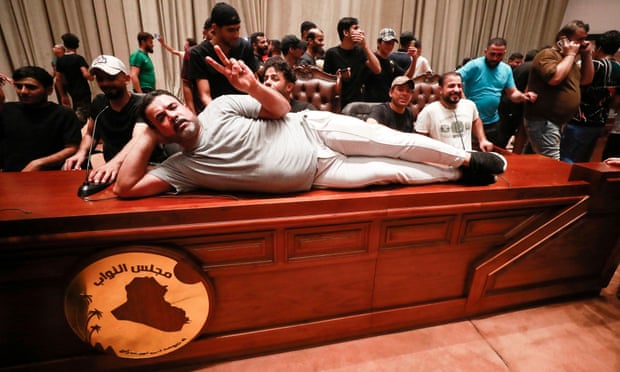
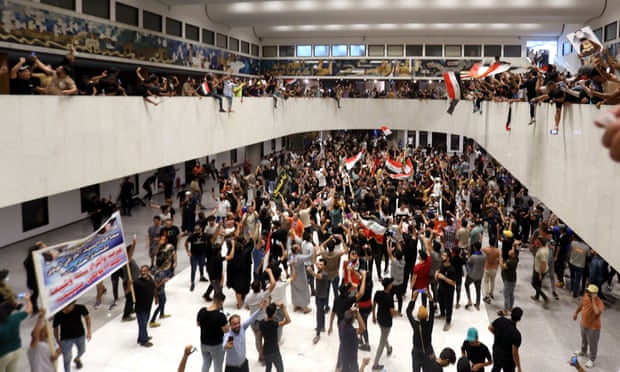
Hundreds of supporters of powerful Iraqi cleric Moqtada al-Sadr danced and sang in parliament after storming Baghdad’s high-security Green Zone in protest at a rival bloc’s nomination for prime minister.
Police fired barrages of teargas in a bid to stop the protesters from breaching the gates of the heavily fortified Green Zone, but the crowds surged forward and entered parliament.
“I am against the corrupt officials who are in power,” said protester Mohamed Ali, a 41-year-old day labourer, one of the hundreds who entered the zone that is home to both government buildings and diplomatic missions, before later leaving peacefully.
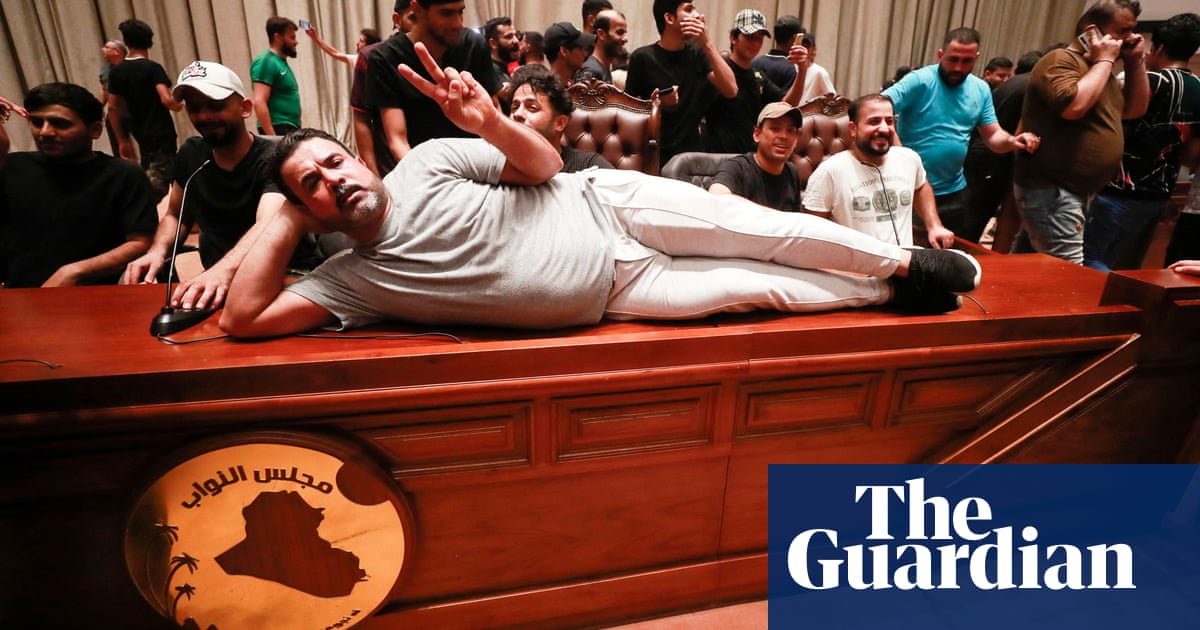
Protesters from rival Shia blocs have taken to the streets of several Iraqi cities in a show of force that sparked fears of a descent into violence amid a 10-month political standoff about naming a new government.
The rallies followed a weekend occupation of the Iraqi parliament by supporters of the powerful Shia cleric Moqtada al-Sadr, who has called for the post-2003 political system in Iraq to be overthrown through popular revolt in perhaps the most serious challenge Iraq has faced since the Islamic State terror group overran Mosul and nearly stormed Baghdad in June 2014.
Demonstrators from Iran-backed groups, known as the Coordination Framework, joined the fray as concerns grew of spillover violence among the country’s Shia communities and even deeper chaos for a country battered by a series of socio-economic crises.
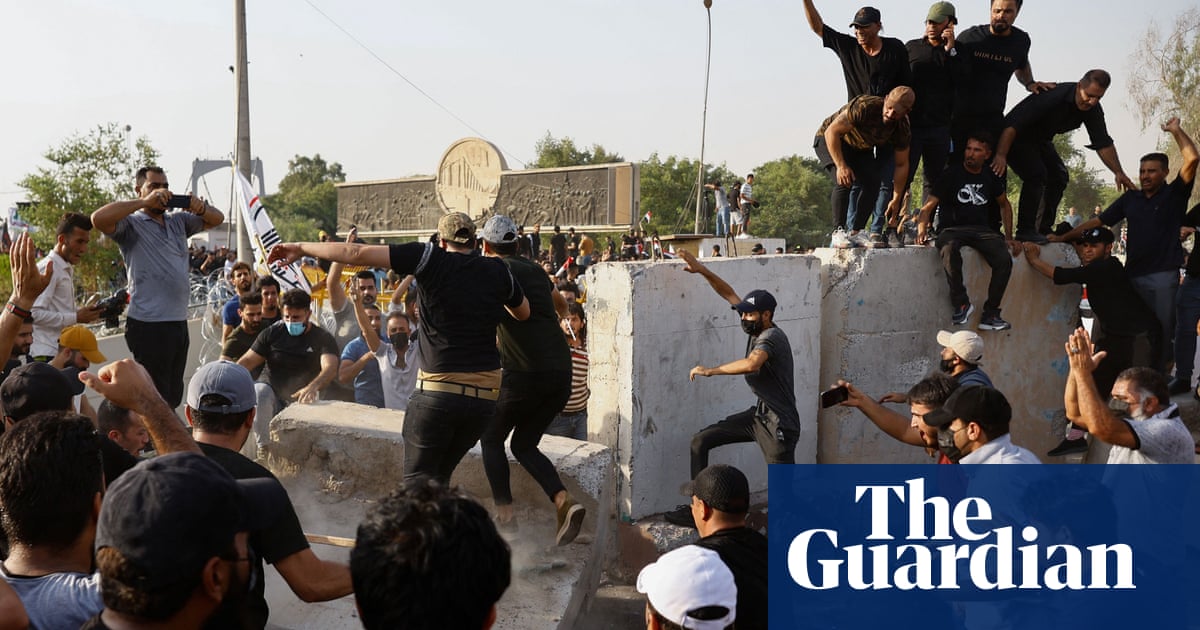
Tuo maa tarvitsee uuden Saddamin...
Two people were killed in Iranian cross-border strikes Wednesday against military bases in Iraqi Kurdistan belonging to the Kurdish Democratic Party of Iran, the KDPI said.
"The forces of the Islamic Republic of Iran attacked the bases and headquarters of the Kurdistan Democratic Party of Iran with missiles and drones" in Koysinjaq, east of Arbil, the KDPI, which operates rear bases in Iraqi Kurdistan, announced in a statement.
"Two people have been killed, while several peshmergas have been wounded," it added, referring to fighters.
Iranian artillery fire has hit border districts of Iraqi Kurdistan on several occasions in recent days.
The fire comes amid tensions generated by the death in Iranian morality police custody of 22-year-old Kurdish woman Mahsa Amini earlier this month after she was arrested in Tehran for allegedly breaching the Islamic republic's strict rules on hijab headscarves and modest clothing.
Protests have swept Iran, prompting a domestic crackdown that has killed at least 76 people, according to the Oslo-based group Iran Human Rights.
Iran's semi-official Fars news agency has put the protest toll at "around 60", inclusive of several members of the Iranian security forces.
Kurdish communities in western Iran share strong connections with Kurdish-inhabited areas of Iraq.
Many cross the border into Iraq to find work, due to a biting economic crisis in Iran driven in large part by US sanctions.
Iran's Revolutionary Guards have warned they will carry on with attacks in neighbouring Iraq until they disarm Kurdish groups that they have accused of spreading unrest in the Islamic republic.
The Islamic Revolutionary Guard Corps on Wednesday launched a barrage of missile and drone strikes on Iraq's autonomous Kurdistan region, killing 14 people including a US citizen.
In a statement late Thursday, the Guards said they were using "all kinds of missiles, kamikaze and combat drones" in the operations against bases and headquarters of what they called "terrorists".
"These operations will continue until the terrorist groups are disarmed and we ask the central government and the government of the northern region of Iraq to show more seriousness in their responsibilities towards Iran as a neighbour," the statement added.
The Guards have accused Iraq-based Kurdish groups of "attacking and infiltrating Iran... to sow insecurity and riots and spread unrest".
A wave of unrest has rocked Iran since Mahsa Amini, a 22-year-old from Iran's Kurdistan province, died on September 16 after her arrest by the morality police in Tehran for allegedly not observing the Islamic republic's strict dress code for women.
The street violence has led to the deaths of dozens of people -- mostly protesters but also members of the security forces -- and hundreds of arrests.
Protests have rocked especially Kurdish communities in western Iran that share strong connections with Kurdish-inhabited areas of Iraq.
PUOLUSTUSVOIMAT laajensi tukikohtaansa Erbilin kaupungissa Pohjois-Irakissa.
Seitsemän vuotta sitten perustetussa suomalaisten tukikohdassa oli aiemmin majoitus-, työskentely- ja säilytystiloja, mutta ei sairaalaa eikä logistiikkaterminaalia.
Nyt Erbilin tukikohta on saanut uudet majoitus- ja toimitilat sekä logistiikkaterminaalin ja sairaalan. Tukikohtaan rakennettiin Suomen kriisinhallinnan historian ensimmäinen iso aurinkovoimala.
Rakennushankkeen kokonaiskustannukset olivat noin 600 000 euroa, ja hanke kesti paikan päällä Irakissa noin kolme kuukautta.
”Hanke oli ensimmäinen Puolustuskiinteistöjen toteuttama rakennushanke kriisinhallintaoperaatiossa. Hankkeessa saatiin paljon arvokkaita kokemuksia ja havaintoja”, kommentoi majuri Tomi Kallunki Maavoimien esikunnan huolto-osastolta.
SUOMALAISTEN sotilaiden kokonaisvahvuus Irakissa on noin 70. Puolustusvoimien mukaan tällä hetkellä suomalaiset toimivat pääosin Irakin Kurdistanin ja Bagdadin alueella.
